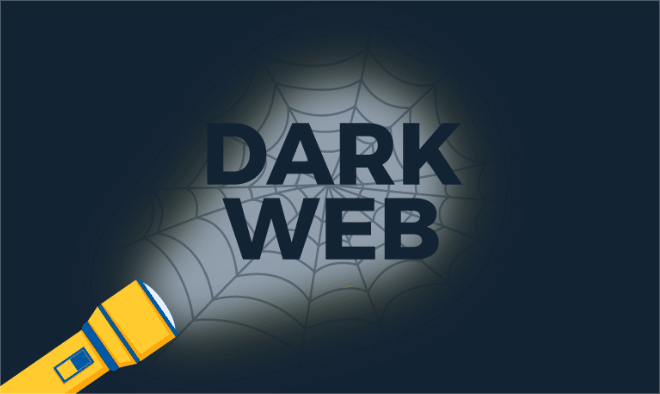What is the dark web used for?
Most people have heard stories of the dark web and the criminal activity that takes
place on it. In most cases, these stories are true. However, there is more to the
dark web than drugs, guns, and stolen credit cards.
What is the dark
web?
The dark web is a part of the Internet that is not indexed
by regular search engines such as Google, Bing and Yahoo. You will not be able to
access the dark web through a standard web browser such as Google Chrome or Firefox;
instead, you will need a special browser called Tor. Any type of information can be
found on the Dark Web. Because of the limited accessibility and anonymity that comes
with using Tor, it is only considered "dark".
To better understand what the
Dark Web is, it is important to know that the Internet consists of three main parts
- the open (or surface) web, the deep web, and the dark web.
The
surface web - This makes up about 10% of the Internet and includes
everything that can be found through search engines like Google. Things like
Facebook, Amazon and Wikipedia are all part of the surface web.
The
deep web - Despite the raging name, the deep web is just a part of the
Internet that can't be easily accessed without a password, etc. This can include
your email account, pages you use for online banking, company servers or even blogs
and other content saved as draft posts in WordPress. The deep web makes up the bulk
of the web.
The dark web - This is the part of the web that
can only be accessed through an onion router like Tor. Sites on the dark web are
easily identified by ".onion" domains, and they often contain content that users
don't want to be found by Google. This can include anything from drugs and guns for
sale to surveillance-minded bloggers or anonymous government critics.

What's the difference between the dark web and the deep web?
It's hard to distinguish between the dark web and the deep web. They are
both part of the Internet and are similar in many ways.
For example, they
are not accessible by traditional search engines such as Google. However, the Deep
Web is any web page that cannot be recognized by search engines, while the Dark Web
is a site that can only be accessed using the Tor browser.
Many people use
the terms "deep web" and "dark web" interchangeably. In fact, this is where the myth
that 96% of the Internet is the "dark web" comes from. In reality, the dark web is
much smaller than both the deep web and the open web. The deep web is actually
benign and includes everything from blog posts saved as drafts to the pages you
visit when banking online.
What is the dark web used for?
The first thing that comes to mind when people consider the dark web is the
criminal activity that takes place. However, the dark web is indeed a place of
extreme online privacy that can be used in many ways for many reasons.
Of
course, this privacy allows criminal activity to flourish, and the dark web can be
used to purchase items such as illegal drugs or stolen credit cards, or to access
illegal and illicit content, such as child pornography. However, the degree of
illegality may vary. For example, some people use the dark web to access content
that is illegal only in specific areas, such as gambling in certain U.S. states, or
to bypass local restrictions on accessing television or movie services.
The
dark web can also be used for perfectly legal and legitimate purposes. For example,
you can join BlackBook, a darknet version of Facebook, which is a strange concept in
itself. Facebook itself also has a .onion address for users from countries where the
social media network is banned. The privacy of the dark web helps protect the
identity of people living in countries where Internet access is monitored or banned,
as well as the identity of whistleblowers trying to expose government or corporate
corruption.
The uses of the dark web depend on the needs of the user, and it
is as useful to journalists and protesters against authoritarian governments as it
is to criminals and drug dealers.

Why use the dark web?
In addition to criminal activities
such as money laundering or accessing dark web marketplaces to buy illegal goods,
the dark web is used for a range of perfectly legitimate purposes. In fact, despite
its poor reputation, the dark web has grown significantly in popularity.
Interest
in Tor and the dark web grew rapidly after Edward Snowden's 2013 revelations about
the level of Internet usage surveillance by the British and U.S. governments.
Following these revelations, the number of Tor users increased from 1 million to an
estimated 6 million.
Many of Tor's users simply browse the surface web
through the Tor browser, which has an interface very similar to Firefox. They are
simply trying to avoid government agencies or their ISPs (Internet Service
Providers) knowing what they are doing or what they are looking at online.
Can the dark web be used for good?
Because
anonymity is so high, the dark web is often exploited by criminals. However, not all
users of the dark web are interested in illegal activities. The dark web is also
used by journalists, whistleblowers, law enforcement agencies, and other legitimate
users who are only interested in stealthy communications. In fact, the Tor network
was created as a way to communicate anonymously, and one of its basic purposes is to
allow people to communicate in countries where censorship and suppression of free
speech are the norm.
The dark web also provides a great deal of practical
value to a range of organizations such as law enforcement agencies or cybersecurity
experts. By keeping a close eye on the dark web, these organizations can keep
abreast of the tools and tactics used by criminals on the dark web. Similarly, many
mainstream media organizations like to visit the dark web to stay up to date on
whistleblower sites and any other newsworthy topics.